Politics
Farmers’ inheritance tax creates ‘chilling effect’ on nature recovery scheme, ex-government legal adviser says

The Growing Conflict Between Inheritance Tax and Environmental Conservation for Farmers
Farmers in the UK are increasingly finding themselves at the crossroads of protecting the environment and securing their family legacies due to a new inheritance tax policy introduced by the government. This policy, announced by Chancellor Rachel Reeves in the October budget, will require farmers to pay a 20% inheritance tax on farms valued over £1 million starting from April 2026. Previously, all farms were exempt from this tax. While the government argues that this change will reduce tax avoidance and align agricultural land values more closely with market rates, farmers and rural business owners are alarmed about the unintended consequences this could have on both farming traditions and environmental conservation efforts.
The Impact on Biodiversity Net Gain (BNG) and Nature Recovery Schemes
One of the key concerns is how this inheritance tax policy intersects with the UK’s Biodiversity Net Gain (BNG) policy, which was introduced by the Conservative government. The BNG policy requires new property developments in England to leave the environment in a better state than before development. This often involves developers paying landowners, many of whom are farmers, to convert their land into natural habitats such as grasslands, woodlands, or wildlife reserves. These agreements typically last for at least 30 years and sometimes much longer, as nature recovery schemes can take decades to establish.
However, the introduction of the inheritance tax has created a “chilling effect” on farmers’ willingness to participate in these long-term environmental schemes, according to Richard Broadbent, an environmental lawyer who previously worked on the BNG policy at Natural England. Broadbent explains that farmers are now more likely to reconsider handing over their land for nature recovery projects if they are worried about their heirs having to break up the farm to pay inheritance taxes. This hesitation could undermine the government’s efforts to promote biodiversity and environmental restoration, as private sector developers may also lose confidence in farmers’ ability to adhere to long-term contracts.
Farmers in a ‘Catch-22’ Situation
The inheritance tax policy has placed farmers in a difficult position, where they must choose between preserving their land for future generations and investing in environmental initiatives that could improve the health of their land and contribute to national biodiversity goals. Victoria Vyvyan, president of the Country Land and Business Association (CLA), which represents 26,000 landowners and rural business owners, criticizes the government for creating an “anti-growth message” that discourages farmers from investing in their land. Vyvyan argues that the new tax regime is forcing farmers to prioritize saving money for tax bills over making improvements to their land or participating in environmental schemes.
Moreover, there is a growing concern that engaging in environmental projects could actually increase the value of farmland, potentially pushing farms over the £1 million threshold and making them subject to inheritance tax. This creates a perverse incentive for farmers to avoid environmental initiatives altogether, despite the potential long-term benefits for biodiversity and ecosystem health. As Broadbent puts it, “If you’re worried that improving your land’s environmental value will inflate your tax bill, you’re going to think twice about participating in these schemes.”
The Risk of Intensive Farming Practices
Another unintended consequence of the inheritance tax policy is the potential for farmers to adopt more intensive farming practices to maximize profits from their existing land. This is because farmers may be reluctant to purchase additional land or expand their operations due to the risk of increasing their farm’s value and thereby incurring higher inheritance taxes. Intensive farming, however, is often associated with negative environmental impacts, such as river pollution, soil degradation, and reduced biodiversity. Broadbent warns that this approach could undo much of the progress made in recent years toward more sustainable farming practices and environmental stewardship.
A Call for Rethinking the Policy
The government’s inheritance tax policy has sparked widespread criticism from farmers, rural business owners, and environmental advocates, who argue that it undermines both the future of farming and the UK’s environmental goals. The CLA and other groups are urging the government to reconsider the policy and find a more balanced approach that does not penalize farmers for investing in their land or participating in nature recovery schemes. As the debate continues, one thing is clear: the UK’s farming community is facing a critical challenge that requires careful consideration of the interplay between economic, social, and environmental priorities. Only by addressing these tensions can the government hope to create a policy framework that supports both the sustainability of farming and the protection of the natural environment for future generations.
-

 Money3 days ago
Money3 days agoConsumer Financial Protection Bureau Adds Error Message To Home Page
-

 Money2 days ago
Money2 days agoWinning Content Strategies For Wealth Managers
-

 Australia1 day ago
Australia1 day agoTropical Cyclone Zelia intensifies to category 2 storm
-

 Asia1 day ago
Asia1 day agoWhat you need to know about 2024 YR4, the asteroid that could hit Earth in about eight years’ time
-

 Entertainment19 hours ago
Entertainment19 hours agoPrince Harry and Meghan Markle’s Best Moments and Photos From the 2025 Invictus Games
-

 Australia13 hours ago
Australia13 hours agoTropical Cyclone Zelia intensifies to category five system off Pilbara coast
-

 Politics1 day ago
Politics1 day agoDozens of religious groups sue to stop Trump admin from arresting migrants in places of worship
-

 Entertainment3 days ago
Entertainment3 days agoEvery Celebrity Who Attended the 2025 Super Bowl: A Guide to the A-Listers at the Big Game










